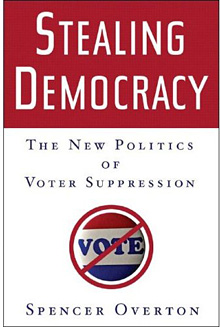 |
 |
 |
 Editorials | September 2006 Editorials | September 2006  
Keep Away the Vote
 New York Times New York Times


| Stealing Democracy: The New Politics of Voter Suppression
by Spencer Overton

Overton takes a wonky but worthy look at the "matrix" of "thousands of election regulations and practices" that can discourage — if not completely suppress — citizens from voting or make their votes count less.

Available at Amazon.com |
One of the cornerstones of the Republican Party's strategy for winning elections these days is voter suppression, intentionally putting up barriers between eligible voters and the ballot box. The House of Representatives took a shameful step in this direction yesterday, voting largely along party lines for onerous new voter ID requirements. Laws of this kind are unconstitutional, as an array of courts have already held, and profoundly undemocratic. The Senate should not go along with this cynical, un-American electoral strategy.

The bill the House passed this week would require people to show photo ID to vote in 2008. Starting in 2010, that photo ID would have to be something like a passport, or an enhanced kind of driver's license or non-driver's identification, containing proof of citizenship. This is a level of identification that many Americans simply do not have.

The bill was sold as a means of deterring vote fraud, but that is a phony argument. There is no evidence that a significant number of people are showing up at the polls pretending to be other people, or that a significant number of noncitizens are voting.

Noncitizens, particularly undocumented ones, are so wary of getting into trouble with the law that it is hard to imagine them showing up in any numbers and trying to vote. The real threat of voter fraud on a large scale lies with electronic voting, a threat Congress has refused to do anything about.

The actual reason for this bill is the political calculus that certain kinds of people - the poor, minorities, disabled people and the elderly - are less likely to have valid ID. They are less likely to have cars, and therefore to have drivers' licenses. There are ways for nondrivers to get special ID cards, but the bill's supporters know that many people will not go to the effort if they don't need them to drive.

If this bill passed the Senate and became law, the electorate would likely become more middle-aged, whiter and richer - and, its sponsors are anticipating, more Republican.

Court after court has held that voter ID laws of this kind are unconstitutional. This week, yet another judge in Georgia struck down that state's voter ID law.

Last week, a judge in Missouri held its voter ID law to be unconstitutional. Supporters of the House bill are no doubt hoping that they may get lucky, and that the current conservative Supreme Court might uphold their plan.

America has a proud tradition of opening up the franchise to new groups, notably women and blacks, who were once denied it. It is disgraceful that, for partisan political reasons, some people are trying to reverse the tide, and standing in the way of people who have every right to vote. | 
 | |
 |



